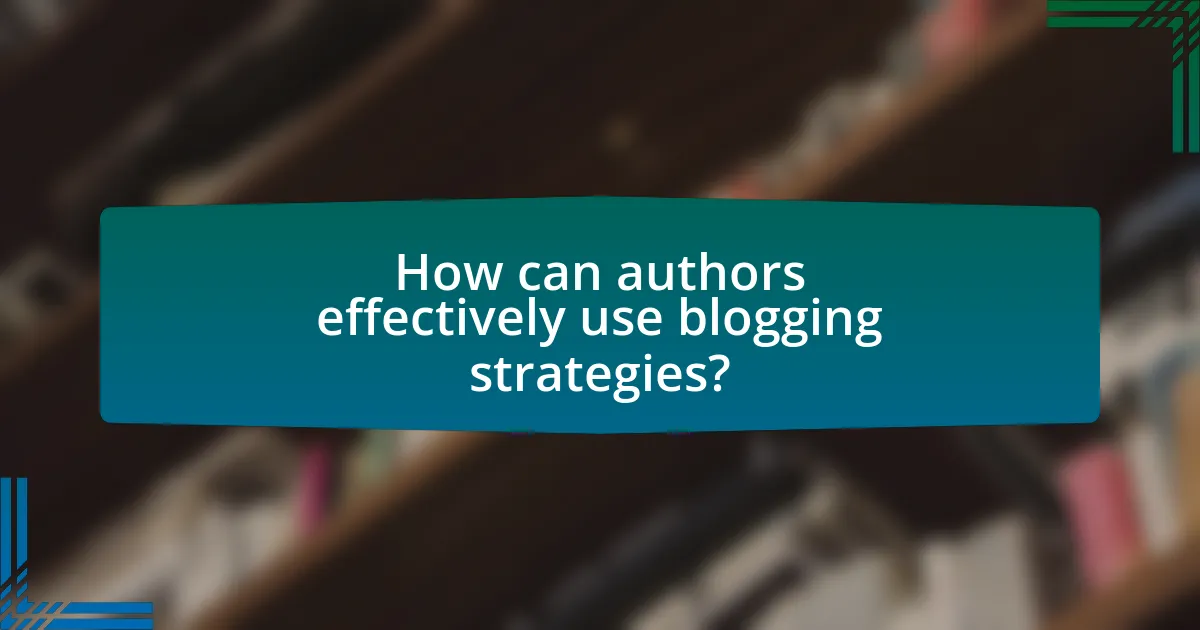Blogging serves as a powerful tool for authors to enhance their portfolios by showcasing writing skills, establishing expertise, and attracting a broader audience. Key benefits include increased visibility through search engine indexing, audience engagement via comments and social media, and the opportunity to refine writing abilities. Authors can effectively utilize blogging strategies by creating diverse content, optimizing for SEO, and promoting their posts through social media and email newsletters. Additionally, personal experiences and book reviews can foster community and credibility, while various tools and platforms can streamline the blogging process. Overall, consistent and engaging blogging practices can significantly impact an author’s visibility and success in the literary market.

How can blogging enhance an author portfolio?
Blogging can enhance an author portfolio by showcasing writing skills, establishing expertise, and attracting a wider audience. Through regular blog posts, authors can demonstrate their unique voice and style, which helps potential readers and publishers assess their capabilities. Additionally, blogging allows authors to engage with their audience, fostering a community around their work, which can lead to increased visibility and opportunities for collaboration. According to a study by the Content Marketing Institute, 70% of consumers prefer getting to know a company via articles rather than ads, highlighting the effectiveness of content in building relationships and credibility.
What are the key benefits of blogging for authors?
Blogging offers authors several key benefits, including increased visibility, audience engagement, and enhanced writing skills. Increased visibility occurs as authors publish content that can be indexed by search engines, leading to higher chances of being discovered by potential readers. Audience engagement is fostered through comments and social media sharing, allowing authors to build a community around their work. Additionally, regular blogging helps authors refine their writing skills, as consistent practice leads to improved clarity and style. According to a study by HubSpot, companies that blog receive 97% more links to their websites, demonstrating the effectiveness of blogging in attracting attention and building an audience.
How does blogging improve visibility for an author?
Blogging improves visibility for an author by increasing their online presence and engagement with readers. When authors publish blog posts, they create content that can be indexed by search engines, making it easier for potential readers to discover their work. Additionally, regular blogging establishes the author as an authority in their niche, attracting a dedicated audience. According to a study by HubSpot, companies that blog receive 97% more links to their websites, which enhances their visibility and credibility. This increased traffic can lead to higher book sales and more opportunities for collaboration within the literary community.
In what ways can blogging showcase an author’s writing style?
Blogging showcases an author’s writing style through consistent tone, vocabulary choice, and structural techniques. The author’s unique voice emerges in their choice of words and phrases, which reflects their personality and perspective. For instance, an author who uses humor and informal language demonstrates a casual style, while one who employs complex vocabulary and formal syntax indicates a more sophisticated approach. Additionally, the structure of blog posts, including the use of headings, bullet points, and paragraph length, can reveal an author’s organizational skills and ability to engage readers. This is supported by the fact that readers often identify an author’s style through these elements, as noted in studies on reader perception and author branding.
What types of content should authors include in their blogs?
Authors should include a variety of content types in their blogs to engage readers and showcase their expertise. This content can include book reviews, writing tips, personal anecdotes, industry news, and guest posts from other authors. For instance, book reviews allow authors to share their opinions on literature, which can attract readers interested in similar genres. Writing tips can demonstrate the author’s knowledge and help aspiring writers, while personal anecdotes create a connection with the audience. Industry news keeps readers informed about trends and developments, and guest posts can diversify content and introduce new perspectives. These content types not only enhance the author’s portfolio but also foster a community around their work.
How can authors use personal experiences in their blog posts?
Authors can use personal experiences in their blog posts to create relatable and authentic content that resonates with readers. By sharing specific anecdotes, authors can illustrate their points, making complex ideas more accessible and engaging. For instance, a writer discussing the challenges of the publishing process can recount their own journey, providing insights that others may find valuable. This approach not only builds a connection with the audience but also establishes the author’s credibility and expertise in their field. Research indicates that personal storytelling can significantly enhance reader engagement, as it fosters emotional connections and encourages sharing, thereby expanding the author’s reach and influence.
What role do book reviews play in an author’s blog?
Book reviews play a crucial role in an author’s blog by enhancing credibility and engaging the audience. They provide an opportunity for authors to showcase their expertise in literature, attract readers, and foster a community around their work. By sharing thoughtful and well-articulated reviews, authors can demonstrate their understanding of storytelling, character development, and thematic elements, which can resonate with potential readers. Furthermore, book reviews can improve search engine visibility, as they often contain keywords related to popular titles and genres, thus driving traffic to the author’s blog. This traffic can lead to increased book sales and a stronger author brand.

How can authors effectively use blogging strategies?
Authors can effectively use blogging strategies by creating consistent, high-quality content that engages their target audience. This involves identifying a niche relevant to their writing, such as genre-specific topics or writing tips, and regularly posting articles that provide value to readers. Research indicates that blogs with a consistent posting schedule can increase audience engagement by up to 50%, as regular updates keep readers returning for more. Additionally, authors should utilize SEO techniques to enhance visibility, such as incorporating relevant keywords and optimizing meta descriptions, which can improve search engine rankings and attract more visitors. Engaging with readers through comments and social media further fosters a community around the blog, enhancing the author’s portfolio and visibility in the literary market.
What are the best practices for creating engaging blog content?
The best practices for creating engaging blog content include understanding your audience, crafting compelling headlines, using visuals, and incorporating storytelling. Understanding your audience allows you to tailor content to their interests and needs, which increases engagement. Compelling headlines attract readers; studies show that 80% of people read headlines but only 20% read the content. Using visuals, such as images and infographics, enhances comprehension and retention, as articles with visuals receive 94% more views. Incorporating storytelling makes content relatable and memorable, as narratives can evoke emotions and foster connections with readers.
How can authors optimize their blog posts for SEO?
Authors can optimize their blog posts for SEO by incorporating relevant keywords, crafting compelling titles, and ensuring high-quality content. Using tools like Google Keyword Planner, authors can identify keywords that potential readers are searching for, which should be naturally integrated into the blog post. Compelling titles that include these keywords can improve click-through rates; for example, a title like “Top 10 Tips for Writing Engaging Fiction” is both informative and keyword-rich. Additionally, high-quality content that provides value to readers encourages longer dwell times and reduces bounce rates, both of which are favorable for SEO rankings. According to a study by HubSpot, companies that prioritize blogging are 13 times more likely to achieve a positive ROI, highlighting the effectiveness of SEO-optimized content in driving traffic and engagement.
What techniques can authors use to promote their blog posts?
Authors can promote their blog posts through various techniques, including leveraging social media platforms, engaging in guest blogging, utilizing email newsletters, and optimizing for search engines. Social media platforms like Twitter, Facebook, and Instagram allow authors to share links to their posts, increasing visibility and engagement. Guest blogging on established sites can introduce authors to new audiences and drive traffic back to their own blogs. Email newsletters enable authors to directly reach their subscribers with updates and links to new content, fostering a loyal readership. Additionally, optimizing blog posts for search engines through keyword research and SEO best practices can enhance discoverability, leading to increased organic traffic. These techniques are supported by studies showing that social media sharing can boost blog traffic by up to 200%, and email marketing has an average ROI of $42 for every dollar spent.
How can authors build a community through their blogs?
Authors can build a community through their blogs by engaging with their audience, providing valuable content, and encouraging interaction. Engaging with the audience involves responding to comments, asking for feedback, and creating posts that invite discussion. Providing valuable content means sharing insights, tips, and personal experiences that resonate with readers, fostering a sense of connection. Encouraging interaction can be achieved through polls, questions, and calls to action that prompt readers to share their thoughts. Research shows that blogs with higher engagement rates often lead to stronger community ties, as seen in studies by the Content Marketing Institute, which highlight the importance of audience interaction in building loyalty and community.
What strategies can authors use to encourage reader interaction?
Authors can encourage reader interaction by incorporating calls to action within their content. By prompting readers to leave comments, share their thoughts, or participate in polls, authors create opportunities for engagement. Research indicates that blog posts with clear calls to action can increase reader interaction by up to 30%, as they guide readers on how to respond. Additionally, authors can utilize social media platforms to foster discussions around their blog content, further enhancing interaction. Engaging with readers through timely responses to comments also builds a community, encouraging ongoing dialogue and connection.
How can authors leverage social media to enhance their blog’s reach?
Authors can leverage social media to enhance their blog’s reach by actively sharing their blog content across various platforms, engaging with their audience, and utilizing targeted advertising. By posting links to their blog articles on platforms like Twitter, Facebook, and Instagram, authors can drive traffic directly to their blogs. Engaging with followers through comments and discussions fosters a community, encouraging shares and increasing visibility. Additionally, using targeted ads on social media can reach specific demographics, amplifying the blog’s exposure. Research indicates that social media can increase blog traffic by up to 200%, demonstrating its effectiveness in expanding reach.

What tools and resources can authors use for blogging?
Authors can use various tools and resources for blogging, including content management systems, writing aids, and analytics tools. Popular content management systems like WordPress and Blogger provide user-friendly interfaces for creating and managing blog posts. Writing aids such as Grammarly and Hemingway Editor help authors improve their writing quality by offering grammar checks and readability assessments. Additionally, analytics tools like Google Analytics enable authors to track blog performance, audience engagement, and traffic sources, allowing for data-driven decisions to enhance their blogging strategy. These tools collectively support authors in creating, refining, and optimizing their blog content effectively.
What blogging platforms are best suited for authors?
The best blogging platforms for authors are WordPress, Medium, and Wix. WordPress offers extensive customization options and plugins tailored for writers, making it ideal for building a professional author website. Medium provides a built-in audience and a clean, minimalist interface that allows authors to focus on their writing and engage with readers easily. Wix combines user-friendly design tools with the ability to create visually appealing sites, which can help authors showcase their portfolios effectively. Each platform supports SEO features, enhancing visibility and reach for authors’ work.
How do different platforms compare in terms of features and usability?
Different blogging platforms vary significantly in features and usability, impacting an author’s ability to enhance their portfolio. For instance, WordPress offers extensive customization options and plugins, making it highly flexible for various needs, while platforms like Medium prioritize simplicity and ease of use, focusing on content creation without the need for technical skills. Additionally, Wix provides drag-and-drop functionality, appealing to users who prefer visual design, whereas Blogger offers straightforward setup but limited features. According to a 2022 survey by Website Builder Expert, 43% of users prefer WordPress for its versatility, while 30% favor Medium for its community engagement features. These statistics illustrate how platform choice can directly influence an author’s blogging experience and portfolio development.
What plugins or tools can enhance an author’s blogging experience?
Plugins and tools that can enhance an author’s blogging experience include Yoast SEO, Grammarly, and Jetpack. Yoast SEO helps optimize blog content for search engines, improving visibility and traffic; it provides real-time feedback on readability and keyword usage. Grammarly enhances writing quality by offering grammar and style suggestions, ensuring polished and professional posts. Jetpack offers a suite of features including site security, performance optimization, and analytics, allowing authors to manage their blogs effectively. These tools collectively improve content quality, increase audience engagement, and streamline blog management, making them essential for authors looking to enhance their blogging experience.
What are some common challenges authors face when blogging?
Authors face several common challenges when blogging, including maintaining consistent content creation, engaging their audience, and managing time effectively. Consistent content creation is crucial as it helps build a loyal readership; however, many authors struggle to produce regular posts due to competing writing projects or personal commitments. Engaging the audience is another challenge, as authors must not only attract readers but also keep them interested through compelling writing and interaction. Time management is also a significant hurdle, as authors often juggle multiple responsibilities, making it difficult to dedicate sufficient time to their blogs. These challenges can hinder an author’s ability to effectively use blogging as a tool to enhance their portfolio.
How can authors overcome writer’s block in their blogging efforts?
Authors can overcome writer’s block in their blogging efforts by implementing structured writing routines and engaging in brainstorming techniques. Establishing a consistent writing schedule helps create a habit, making it easier to produce content regularly. Techniques such as free writing, where authors write continuously for a set period without worrying about grammar or structure, can stimulate creativity and generate new ideas. Research indicates that setting specific, achievable goals can also enhance motivation and reduce the anxiety associated with writer’s block. For instance, a study published in the Journal of Creative Behavior found that writers who set daily word count targets reported higher levels of productivity and lower instances of block.
What strategies can authors use to maintain a consistent blogging schedule?
Authors can maintain a consistent blogging schedule by implementing a content calendar, setting specific writing goals, and utilizing automation tools. A content calendar helps authors plan and organize their posts in advance, ensuring a steady flow of content. Setting specific writing goals, such as dedicating a certain number of hours per week to writing, can enhance productivity and commitment. Additionally, automation tools like scheduling software allow authors to publish posts at predetermined times, reducing the pressure of real-time posting. These strategies are effective as they provide structure and accountability, which are essential for consistency in blogging.
What practical tips can authors implement to maximize their blogging impact?
Authors can maximize their blogging impact by consistently producing high-quality, engaging content that resonates with their target audience. This involves understanding the audience’s interests and preferences, which can be achieved through research and analytics tools that track reader engagement and feedback. Additionally, authors should optimize their blog posts for search engines by using relevant keywords, which can increase visibility and attract more readers.
Incorporating visuals, such as images and infographics, can enhance the appeal of blog posts and improve reader retention. Authors should also promote their blogs through social media platforms and email newsletters to reach a broader audience. Regularly updating content and interacting with readers through comments can foster a community around the blog, encouraging repeat visits and deeper engagement.
These strategies are supported by data indicating that blogs with consistent posting schedules and interactive elements see higher engagement rates, with HubSpot reporting that companies that blog receive 97% more links to their websites.



